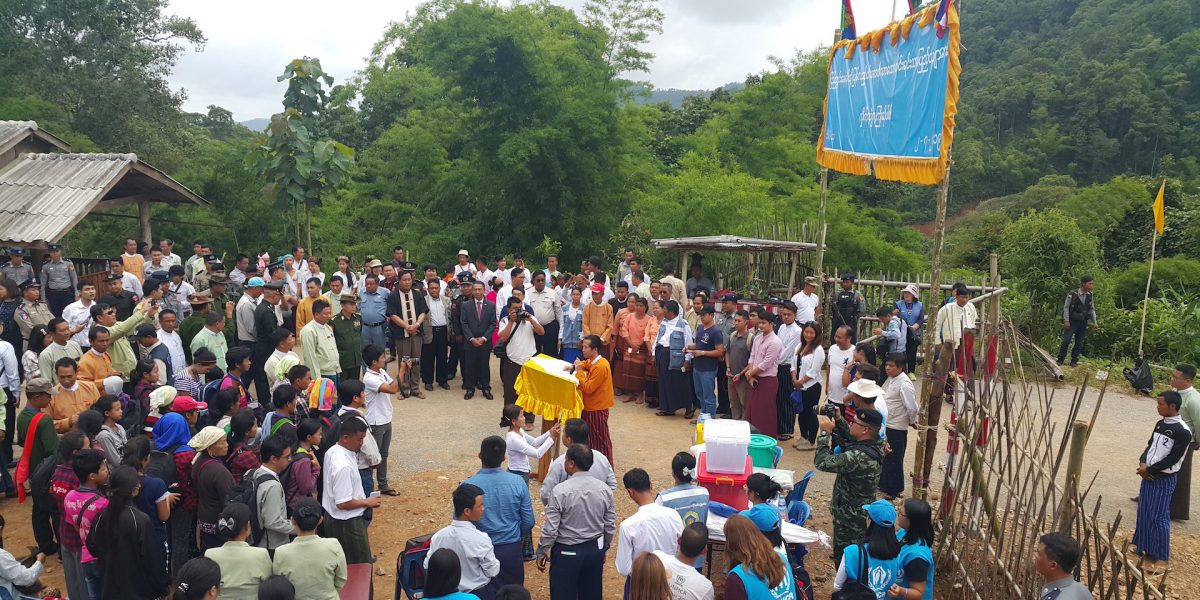Thailand – Myanmar: A new life on the other side
04 July 2019|Boe Meh

Loikaw, 4 July 2019 – The ‘returnees’ is the name given to the refugees who lived in the camps on the Thai-Myanmar border and who are now returning to Myanmar, after 30 years away from their home country. On 2 July 2019, 32 refugees from 9 families voluntarily returned from Ban Mai Nai Soi refugee camp situated in Mae Hong Son, Thailand to Kayah State, Myanmar through the facilitation of UNHCR, and the Myanmar and Thailand governments. It is the third official return of Karenni refugees to Kayah State.
Linda*, a refugee student from Ban Mai Nai Soi refugee camp in Thailand, is about to return to her home country, Myanmar. Linda, who was born in the camp, does not know much about life in Myanmar. She spent her whole life in the camp and she has some difficulty imagining a life outside the camp. “I went back only once to my original village in Myanmar”, she said. “I am happy and excited to return”, she continued.
In Thailand, Linda lived in the camp called Ban Mai Nai Soi situated in Mae Hong Son area. There, she grew up with her family. She went to a school in the camp supported by the Jesuit Refugee Service (JRS) Thailand. As we met her during the transition at the border, she introduced us to her father and her older sister, a young girl who just finished Social Development studies in the camp and will now be looking for a job in her new hometown.
Linda and her family were part of the third facilitated return in Kayah State. They were accompanied to the border point by JRS staff, representatives from Mae Hong Son province’s government authorities, UNHCR, IOM, NGOs and Myanmar Embassy. On the other side of the border point, Kayah State Government authorities officially welcomed them. The returnees were brought back to Mese Township Hall and given a lunch break, then a short welcoming ceremony with some cultural dances was held. Along with JRS staff, about 100 people were there to welcome them, State government officials (Social Welfare, Education, Health, Agriculture, Immigration, Police, Regional Military Command, etc.), UN agencies, non-governmental organizations, some civil society organizations and local media.
The State Government along with various departments, NGOs and UNHCR supported the returnee families with rice, cooking oil, drinking water, some house items and some cash. While most of the returnees will be welcomed into their relatives’ houses first, some requested the need for shelter or housing materials to the State Government.
Out of the 32 returnees, 15 of the returnees are children, out of whom 10 will be continuing their basic education in State Government Schools at different levels. The Ministry of Education (MoE), with the support of UNICEF, provided them with some notebooks and backpack. Beatrice*, a returnee refugee woman who came back with her two primary school-aged children said, “We return ahead. My husband is still there (in the camp) working. He will follow. We return now so that my children can have good basics in education.”
After the welcoming ceremony, each returnee family was brought to service booths. The first booth was held by the Immigration services who, supported by the Norwegian Refugee Council, verified and registered each returnee and immediately processed their household registration cards and ID cards. The other booths gave information on registering and logistics, but also education, vocational training opportunities and health.
The education transfer is one of the most crucial points for families who are returning from the camps to Myanmar. It is quite worrisome for the parents to ensure that their children can attend school without any delay. In the previous returns, this aspect was still chaotic. On this matter, a township education officer commented “I feel very excited this time, as it is easier and faster. I am very happy that all the students brought school transfer certificates. No one missed it.” This reflects the good work of the Karenni Education Department (KnED) in the camps, JRS and partners to ensure that the school transfer documents are with the students upon return to Myanmar.
Despite the many improvements of this return, some progress are still needed especially concerning the logistics of the transportation back to the respective returning places of the former refugees, and also concerning the language support needed by the returnees to answer some questions.
The first return to Kayah State was facilitated in May 2018 with 20 returnees and the second was in February 2019 with 59 returnees. There are still about 95,000 refugees in the nine camps along the Thailand-Myanmar border while about 15,000 refugees had returned to Myanmar spontaneously without UNHCR’s assistance since 2013. UNHCR has opened Voluntary Repatriation Center (VRC) in the camps and provided counselling to those who are interested to return with the facilitation of UNHCR since 2016. Nationwide, since October 2016, it has been the fourth batch of facilitated return and a total of 1,039 refugees had returned to Myanmar.
JRS is working on both sides of the Thai-Myanmar border to ensure continuity in education. In Thailand, JRS promotes an education that prepares refugees upon return. In Myanmar, JRS assisted the teachers in Kayah to prepare 28 returnee students to take the placement exam in May which they all passed. JRS, in coordination and collaboration with the local Church, MoE and other education stakeholders in Myanmar will continue to support for a smooth transition of returnee students into the government education system as well as well integration of returnees in the host communities.
-Boe Meh (Loikaw Diocese)
*Names have been changed to protect privacy

